Canada
Denial and the Free Speech Crisis
In fact, freedom of speech has been repeatedly repressed at the University of Guelph, and this has been going on for at least a decade.
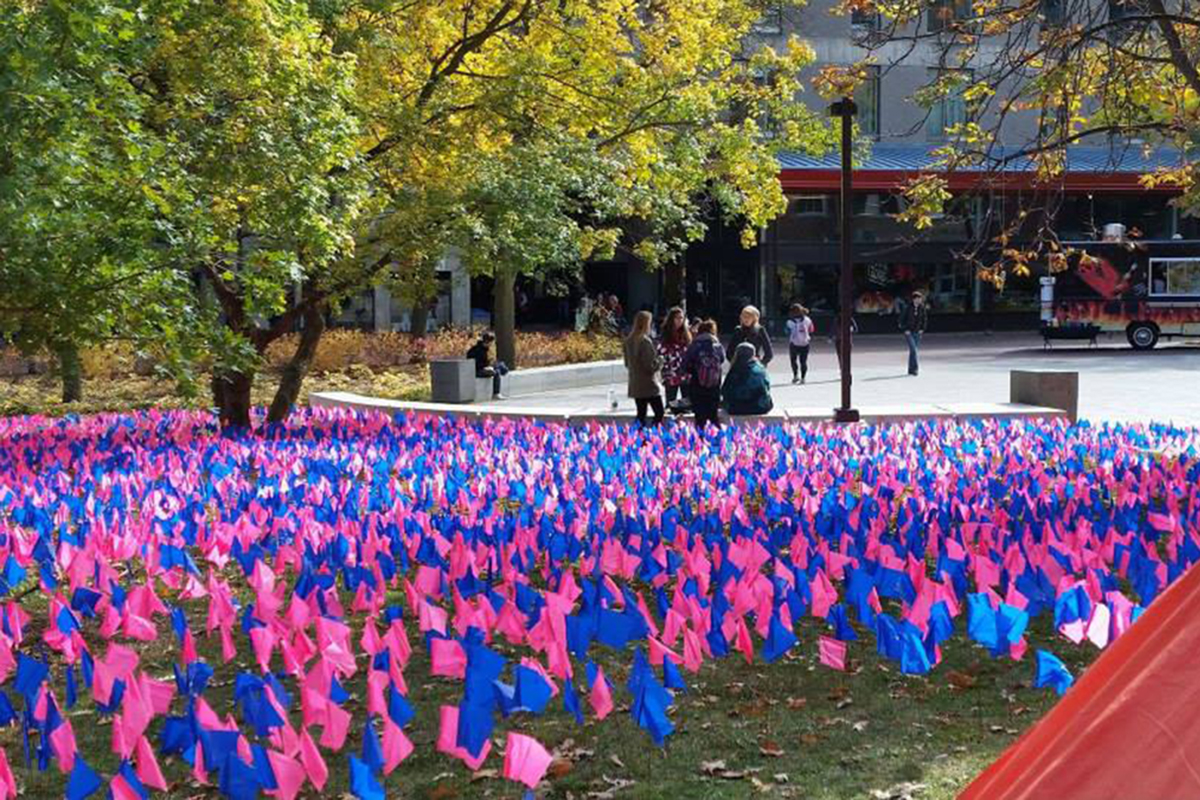
In a recent article for Quillette, Dan Meegan, an associate professor of psychology at the University of Guelph, argues that the restriction of freedom of speech we hear about in the news is a rarity in Canada—and that it is certainly not an issue at the University of Guelph. Respectfully, Meegan is absolutely wrong on this latter point. In fact, freedom of speech has been repeatedly repressed at the University of Guelph, and this has been going on for at least a decade.
Meegan explains that in his nearly 20 years at the University of Guelph, he can’t recall even one time his students protested the expression of an offensive idea. Not even when he discusses research on gender differences in his evolutionary psychology unit. The only time a student objected to one of his reading materials, she talked to him about it politely. So, he argues, while there is much ado about freedom of speech, it’s not at issue in Guelph.
Nevertheless, as a former University of Guelph student, I’ve witnessed the suppression of free speech at the university. Not only that, but both students and the administration are complicit in the censorship. The fact that Meegan’s classes haven’t been disrupted by protestors is a very low bar for measuring the campus-wide status of freedom of speech. I took his classes; the ideas were very palatable. I remember being presented with studies showing that men scored slightly higher on certain mental tasks, while women scored slightly higher on others. All the while we were assured that these were only averages, and that, overall, men and women have the same average IQs. But, while I’m happy to hear that no one is trying to shut down Meegan’s classes, it remains the case that students and administration are shutting down other ideas.
This brings me to the censorship of Guelph’s pro-life club, Life Choice. Because Life Choice’s struggles with the university have been numerous and well documented, they’ll be the focus of this article. This focus is not representative of my views on the pro-life/pro-choice debate—my remarks are made in the spirit of the wisdom often misattributed to Voltaire: “I disapprove of what you say, but I will defend to the death your right to say it.” My approval or disapproval of abortion is not relevant to this article. The only opinion that is relevant is that I believe both sides have a right to freely air their views.
In 2008, the Central Student Association (CSA) revoked Life Choice’s club status following their “Life Fair” event. The ban was handed down after the group allegedly distributed offensive materials, but it’s worth noting that the group wasn’t given due process under the CSA’s own policies. This incident was followed, in 2015, by the censorship of the group’s Cannon display.
For those unfamiliar with the University of Guelph, I’ll explain the long-standing tradition of the Cannon. The Cannon is an actual metal cannon that sits in the middle of campus—it’s a beloved institution and landmark. Painting the Cannon is a sort of sanctioned graffiti that every student does at least once in their time on campus. Students might paint the Cannon with their dorm or their sports team or to promote an event. The unwritten rules are passed down from student to student. You are only allowed to paint the Cannon after dark. If you leave the Cannon unattended after painting it, other students are allowed to paint over your message before sunrise. You can “guard” the Cannon at night to ensure other students don’t paint over it, but once the sun is up, it’s safe until dusk.
So in 2015, Life Choice painted the Cannon with a pro-life message and set up a display of pink and blue flags to represent the number of abortions that take place each year:
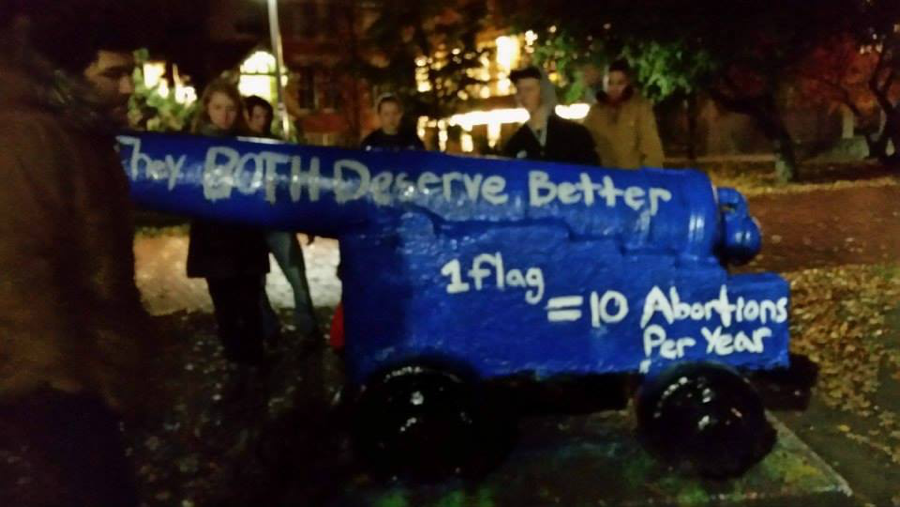
The next day, students defaced the message with spray paint. By mid-afternoon, the entire Cannon had been covered with sheets of paper emblazoned with pro-choice messages:
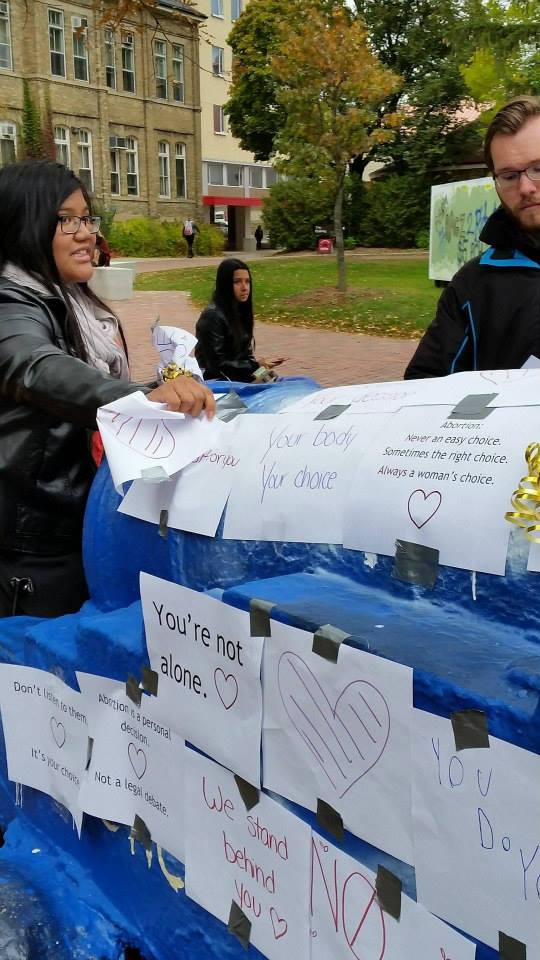
Outsiders might find the magnitude of this transgression hard to grasp—after all, it sounds like a public message board, with a constant rotation of messages. To put this incident in context, I spent 4 years on campus and, in that time, the Cannon was painted between 4 and 7 times per week. Over the course of my time at the university, I probably saw 350 Cannon displays of various kinds. No one ever touched the Cannon during daylight hours. I never saw the rules of Cannon painting broken. No department or club rivalry ever came between the Cannon and the conventions of our beloved tradition.
One student responded to the incident with an article in the student newspaper, in which the author argued that the display was an example of hate speech: “Hate speech happens when an opinion becomes an attack.” Another student posted the following comment to Facebook, along with a picture of the censored Cannon: “Yes you have a right to your opinion, but you do NOT have a right to express hate messages using student property.” Apparently, University of Guelph students think that a display of statistics is hate speech. The Ontarian author goes on to argue that: “The reason this display is more than just an exercise of freedom of speech, in my opinion, is because of their decision to make a visually striking display right in the middle of campus.” So, at least one student at the University of Guelph believed that freedom of speech is only acceptable if that speech isn’t visible.
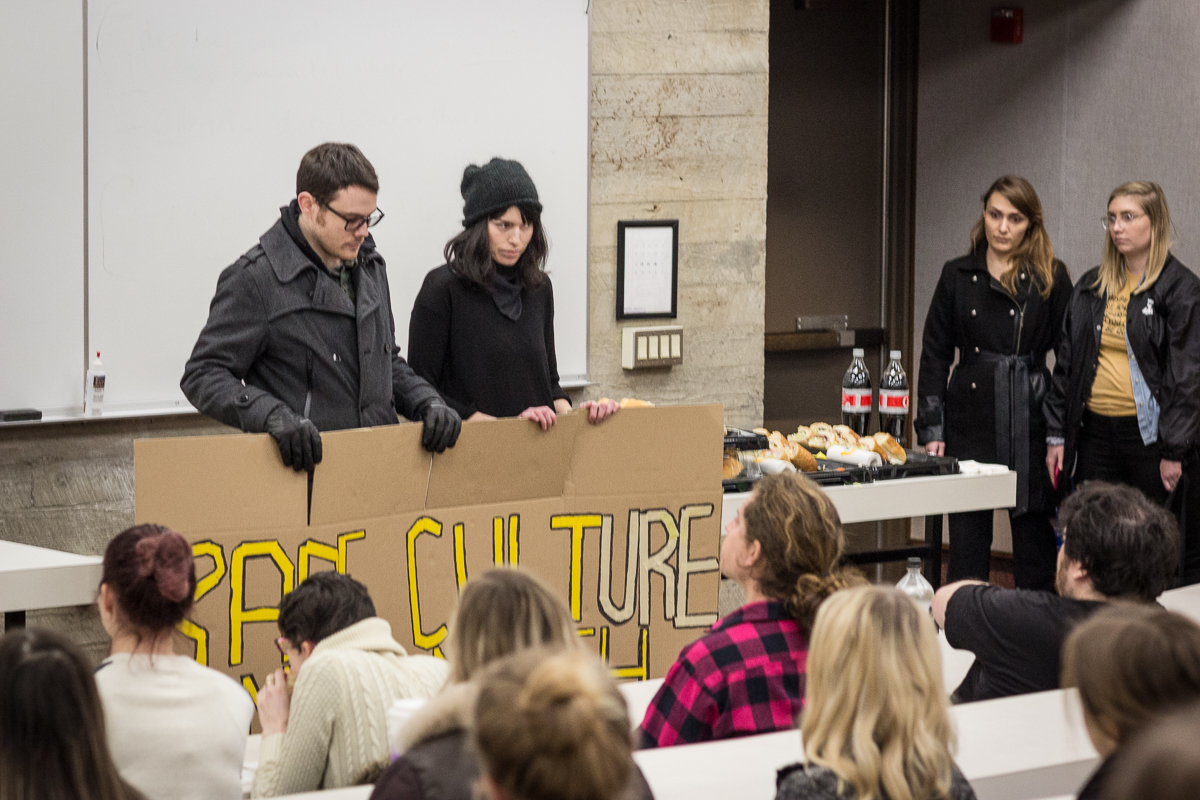
In 2018, Life Choice had an event shut down before it could even begin. Campus Freedom Index explains the course of events:
On February 20, 2018, the registered student group Life Choice applied to hold a tabling event at the University. This event was to feature a “free speech board” and encourage passers-by to respond to the question “What do you think about sex-selective abortion?” by writing their thoughts on a sticky note and placing it on the board. Life Choice applied to also share resources and information with students who engaged with the display.
On February 28, 2018, Life Choice was notified by Student Risk Management that its application to hold the event had been rejected. Student Risk Management requested numerous changes be made to the event, and that Life Choice answer numerous questions including “how the information will be displayed” and “how will you handle if someone is triggered by these conversations”. Life Choice submitted their responses and further details about the event to Student Risk Management on March 1, 2018. Student Risk Management did not respond to this second application and the event was unable to proceed as planned.
It might be objected that the University of Guelph does not have an issue with freedom of speech as a whole—they’re just very pro-choice, and therefore uncommonly sensitive on this particular issue. But it is not possible to value freedom of speech and to also selectively deny it to certain disagreeable ideas. It is also important to be aware of the ways in which the group’s freedoms are deteriorating over time. In 2008, Life Choice held an event, and after the fact, they faced administrative backlash. In 2015, they created a display, which was vandalized the same day. Then, in 2018, they weren’t allowed to hold their event at all.
I wonder—and worry—about what other ideas are being censored. This pro-life group has been tenacious; despite being forced to wage a constant battle with the university for their right to free speech, they remain an active student group. My real concern is what other initiatives have been beaten down, without ever receiving any attention from the press. Besides Life Choice’s activities, I don’t remember any controversial events during my time at the university. Which clubs never got past the initial application? Which events were quietly cancelled after harassment from fellow students? Which ideas were never discussed as a result of administrative pressure?
This brings me to an analysis of the administration’s policy on freedom of speech. The opening line of the University’s Controversial Student Events Protocol assures the reader that the protocol is not meant to limit discussion on controversial topics, along with the usual commitment to inclusion and diversity. But let’s review the wording of the actual rules. Under section 1.0, Purpose & Jurisdiction, the protocol outlines the following (my emphasis):
The Protocol for Planning and Managing Controversial Events was established to provide a mechanism by which Student Affairs can make an assessment as to whether a student event could lead to an act of intolerance, a violation of human rights or present a significant risk to the health and safety of the campus community.
The document goes on to define an “act of intolerance“ as “any action that fosters or expresses hate or prejudice.” These points are important, because if Student Affairs’ assessment concludes that an event does indeed risk provoking an intolerant act, the event will not be allowed to take place. Therefore, closer scrutiny of the phrasing is necessary in order to truly understand what is deemed permissible by this seemingly innocuous terminology. Inserting the definition of “act of intolerance” results in the following (my emphasis):
The Protocol for Planning and Managing Controversial Events was established to provide a mechanism by which Student Affairs can make an assessment as to whether a student event could lead to any action that fosters or expresses hate or prejudice.
This nebulous phrase defines the standard according to which an event will either be approved or forbidden. Banning “an event that expresses hate or prejudice” would make sense, but that is not the standard. Nor is the standard “an event that will cause hateful actions.” Even if organizers have ruled out the possibility that the event could lead to such actions, the event still isn’t in the clear. According to the University’s protocol, an event can be banned if there’s a possibility of it leading to an action that fosters hatred or prejudice. In other words, the event organizer is now responsible for the potential for hatred two degrees away from the event itself.
Consider the example of an event promoting the feel-good message “You are perfect, no matter what.” This might lead annoyed Baby Boomers to post derisive comments on social media about Millennial narcissism and self-obsession, which would fall within the absurdly elastic parameters of the protocol’s ban on the fostering of hatred. Of course, I could be accused of reading too much into this, of over-analyzing accidental sentence structure that was never intended to be used for this level of control. But further analysis of the document only confirms my fears about the administration’s mentality toward controversial ideas.
Here’s a screenshot from the Reporting Section (emphasis mine):
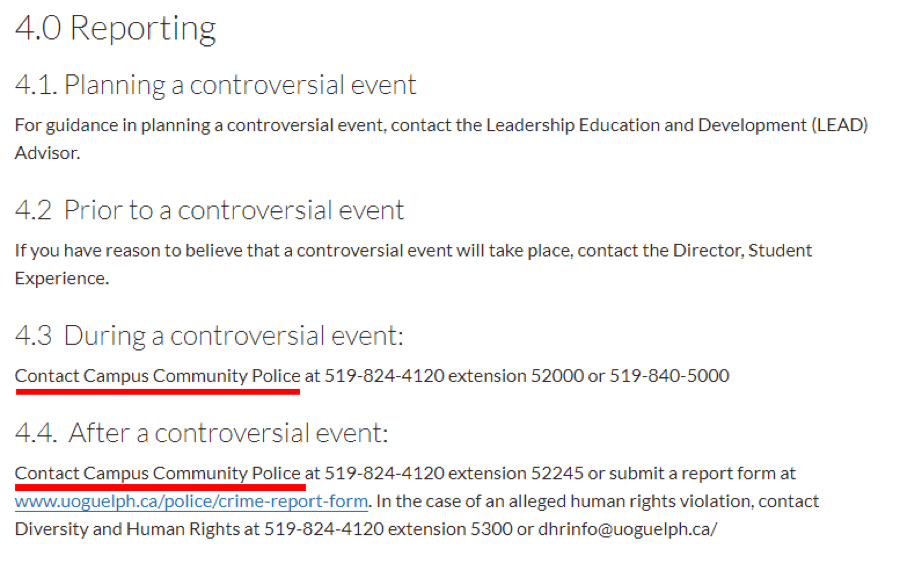
If a student witnesses an event that they deem to be controversial, they’re instructed to call the police. Consider the standard for reporting: the instruction is not to call the police if the student witnesses violence. Nor are students asked to call the police if they suspect an event is about to get out of hand. Students are advised to call the police if they merely witness controversy. This entire section is written as though controversy were a crime. Section 4.2 reads like a tip line. No one writes the words “if you have reason to believe” in reference to something innocuous.
And what exactly can be expected to happen once the campus police arrive? Are they there to shut down the event, or to maintain the peace so that the event can continue without interference? While it doesn’t explicitly say in this section, all we need to do is reference the earlier section discussing the standards for event cancelation. Reading between the lines, it’s clear that such an event would be shut down. How can there be freedom of speech when any controversial event needs to be reported to the authorities? And who, besides the reporter in question, gets to decide what is and is not controversial?
The Implementation section worries me most (emphasis mine):
3.1 Planning a controversial event
Planning needs to include strategies for mitigating the possibility of physical, social and emotional risks, acts of intolerance or a violation of human rights. As such, event planners must:
⦁ Articulate the concrete steps that will be taken during the planning and throughout the event to ensure multiple viewpoints can be heard.
At a glance, this point might look innocuous, but in reality, this is a major issue for freedom of speech. Why? Bear in mind that these are the guidelines for controversial events, which might reasonably be understood to mean the expression of a minority opinion. In such cases, the majority of people will already be familiar with the other side of the argument, and most of them already agree with it. Forcing minority opinions to share time with majority opinions at their own events is a detrimental constraint on freedom of speech. Moreover, sharing time with people who oppose a view essentially guarantees that the event will be a debate. While debates can be valuable, this policy denies minority ideas the opportunity to be promoted uncontested in the same manner as the received wisdom.
What happens if the other viewpoints refuse to participate in the event? This brings us back to Life Choice. According to their 2012 press release, Life Choice scheduled a pro-life/pro-choice debate, but no pro-choice advocate was willing to engage:
With the debate scheduled for the end of the month, Guelph Life Choice contacted the Student Help and Advocacy Centre (SHAC) from the student union for help finding a pro-choice advocate. They declined, stating, “We do not believe that the sexual and reproductive rights of women is [sic] something that should be debated because we see ‘pro-choice’ as the only option. For us, reproductive rights are non-debatable.”
When I initially read this, I was dismayed by pro-choice advocates’ refusal to defend their own position. But then I realized—it’s a brilliant strategy. With the pro-life side already being censored so effectively, what benefit can the pro-choice side possibly gain from enabling a debate? Nothing. And this is how diversity of thought and opinion die. This is how the ideas and concepts that force us to grow get lost. This is how we end up with groupthink and an intellectual monoculture.
The fact that ideas are being censored isn’t even the worst part of the problem on Canadian campuses. As Meegan has inadvertently shown by writing his article, we’re now not even aware of the censorship. We’re in denial that there even is a problem. We have a senior professor at this university taking time out of his day to argue that new freedom of speech legislation is “probably unnecessary.”
Of course, I’m glad that Meegan’s lessons are still among the ideas considered tolerable by the students and administration. But if we don’t wake up, he won’t be teaching that way for long.






